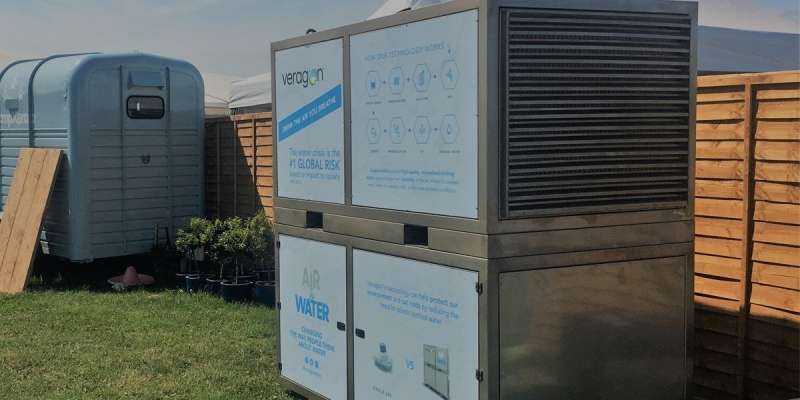March 25, 2018 weblog
Five water XPRIZE finalists named in search for solution breakthroughs

Teams who are coming up with proposed solutions to a global water crisis have moved up to the next stage of the $1.75 million Water Abundance XPRIZE, and the grand prize winner will be made known on August 18.
The XPRIZE announcement this month named five teams which now have status as finalists.
The teams are from U.S., India, U.K. and Australia. The five include professors, professional scientists and engineers. They will share a $250,000 milestone prize purse. The finalists were chosen from a field of 98 teams.
Nick Lavars in New Atlas delivered a roundup of what all five projects are about. One of the five interesting descriptions was that of Veragon & ThinAir Partnership, London-based contestants, who, said Lavars, are "looking to not just harvest regular old water, but use its device to produce high quality mineral water."
These are two entities, Veragon and ThinAir, in partnership. They are focused on atmospheric water generators to deliver mineralized water for drinking.
"Air-to-Water' units convert humidity in the air into mineralized drinking water on a commercial scale, said the prize site. A Veragon 'Air to Water' Generator (AWG) initially draws the humid air through a filtration system. Over at ThinAir, the team is working on a surface material at Imperial College London. "This special combination of surface structure and chemistry takes inspiration from nature to encourage water nucleation and simultaneously provide a route for efficient water run-off with an increase of 370%."
All in all, the global water crisis merits serious attention, and the question is posed: How to give people the power to access fresh water, whenever and wherever they need it?
The prize group's site makes note of over 3 quadrillion gallons of untapped water in the atmosphere—enough to meet the needs of every person on the planet for a year.
All the same, by 2025, an estimated 1.8 billion will live in areas plagued by water scarcity.
Zenia Tata, vice president of Global Impact Strategy at XPRIZE, said, "we are in dire need of decentralized and democratized water breakthroughs now more than ever."
Varghese George, The Hindu, talked about one of the finalists, India-based Uravu. "Uravu is run by a multidisciplinary team of five, with engineering, sciences, architecture and design backgrounds."
Their solution: off-grid water from an air device. The outcome, said the XPRIZE news release, combines the "magic" of material sciences and solar thermal energy.
The Uravu team said on their site, "despite humanity's stunning innovations, we still have not conquered some of our most basic challenges like drinking water. The situation is only getting worse."
They have developed an "aquapanel" to harvest water from the air by way of the power of the Sun. They referred to their patent pending "solar adsorption reactor technology." They said it works efficiently, even in arid areas.
The Water Abundance XPRIZE is a $1.75 million competition. The winner will be responding to the challenge of using energy efficient technologies to address the global water crisis: "Teams will revolutionize access to fresh water by creating a device that extracts a minimum of 2,000 liters of water per day from the atmosphere using 100% renewable energy, at a cost of no more than 2 cents per liter." Australian Aid and the Tata Group are prize sponsors.
Stay tuned for Round 2 in July. Teams will be required to demonstrate their devices can extract a minimum of 2,000 liters of water per day from the atmosphere using 100 percent renewable energy, at a cost of no more than two cents per liter, said the news release.
On what basis were the five finalists chosen? The news release said decisions were made based on "submissions of technical documentation, test results, and video of a solution prototype that can extract water from the atmosphere using any source of energy and without any requirement for minimum water output cost per liter."
The Newcastle Herald drew readers' attention to the University of Newcastle research team's Hydro Harvest Operation.
Their entry was described as "low-cost, fuss-free and energy-efficient." Professor Behdad Moghtaderi was quoted. "We went into the competition wanting to keep the technology as simple as possible to ensure it would have worldwide applications, especially for developing countries." Moghtaderi also said, "Atmospheric water generators are usually based on refrigeration cycles that cool the air to below the dew point, the point at which condensation will form. We're turning that idea on its head. Our process is based on heating the air, not cooling."
The other two teams are JMCC WING and Skydra.
More information: water.xprize.org/
© 2018 Tech Xplore


















